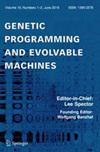w·b·兰登《大白鲨30》
IF 0.9
3区 计算机科学
Q3 COMPUTER SCIENCE, ARTIFICIAL INTELLIGENCE
引用次数: 0
摘要
在《大白鲨》上映30周年之际,基因编程领域有很多值得庆祝的事情。然而,为了在这些成功的基础上继续发展,可能有必要更深入地研究“不太成功”和/或“较少探索”的主题。我们从前者考虑FPGA和GPU平台的作用,从后者考虑协同进化的作用。本文章由计算机程序翻译,如有差异,请以英文原文为准。
W. B. Langdon “Jaws 30”
At the 30th anniversary of ‘Jaws’, the Genetic programming field has much to celebrate. However, in order continue to build on these successes, it might be necessary to look more deeply into the “less successful” and/or “less explored” topics. We consider the role of FPGA and GPU platforms from the former and coevolution from the latter.
求助全文
通过发布文献求助,成功后即可免费获取论文全文。
去求助
来源期刊

Genetic Programming and Evolvable Machines
工程技术-计算机:理论方法
CiteScore
5.90
自引率
3.80%
发文量
19
审稿时长
6 months
期刊介绍:
A unique source reporting on methods for artificial evolution of programs and machines...
Reports innovative and significant progress in automatic evolution of software and hardware.
Features both theoretical and application papers.
Covers hardware implementations, artificial life, molecular computing and emergent computation techniques.
Examines such related topics as evolutionary algorithms with variable-size genomes, alternate methods of program induction, approaches to engineering systems development based on embryology, morphogenesis or other techniques inspired by adaptive natural systems.
 求助内容:
求助内容: 应助结果提醒方式:
应助结果提醒方式:


